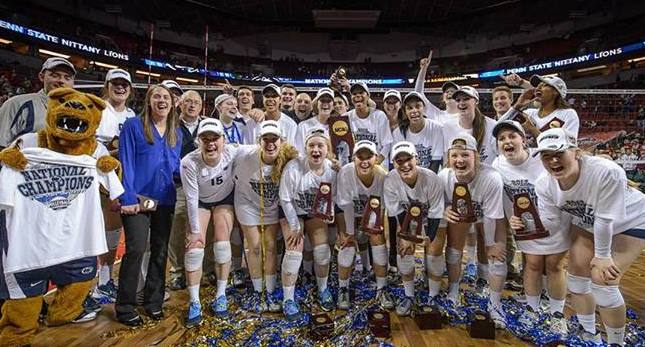By Jim Freeman
July 20, 2014

Penn State Volleyball celebrated their fifth national championship in the last seven years this past December. (NCAA)
"The first task of a leader is to keep hope alive." - Joe Batten (author)
I recently spoke at length with one of the coaches in our volleyball club about coaching philosophies. She was doing research for a doctoral dissertation and I was one of the people interviewed for her paper. We talked for more than an hour about what is important in coaching, what should be emphasized, what should be minimized, the relative importance of winning, and how to teach and inspire players to achieve success.
As I look back on that conversation I think much of it can be whittled down to the responsibility of the coach to create an environment that is attractive to players. It should be an atmosphere where they know they are cared for, one of fairness, high expectations, and common purpose. Mr. Pettit writes, "All great coaching and teaching is built on a DNA of hopefulness: the belief that if we commit to certain behaviors, if we work with enthusiasm and focus, if we care more for the mission of the team than our unwillingness to be uncomfortable, then great things will happen. This is the keystone that my coaching philosophy is built on."
Over the course of more than two decades of coaching I've seen all kinds of coaches and all kinds of teams. Some I've studied diligently. Some I've studied casually. I've seen some coaches that I admired and some I did not. I've seen players prosper in their sporting experiences and I've seen those who did not. The coaches who create an atmosphere of hopefulness are the ones that I've chosen to believe in and emulate. Pettit states, "It is a philosophy that has grown out of years of observing patterns that consistently emerge with exceptional teaching and coaching. It is not what I think great coaching should be. It is not what I have read exceptional coaching should be. It is what I have witnessed whenever a group of talented individuals under the shepherding of an exceptional coach has moved beyond random focus and success to become a great team."
Fostering such an environment presents players and teams with a chance to reach their potential. As a result, giving players and teams what they need as opposed to what I feel like giving them at any particular moment becomes paramount. Over the years I've become more adept at controlling my emotions so that my competitive juices don't spill out all over the court. Many times I'm forced to appear composed and positive when in reality I may feel the opposite. I've learned that what I feel is irrelevant. What is relevant is how I make my team feel. That doesn't mean that correction is not given or standards are low. It means that as a leader I am responsible for the tenor of our practices and games. I am responsible for promoting the idea that we can succeed if we band together and behave in a certain fashion.
Keeping hope alive can at times be fairly easy. At other times it can be nearly impossible. Regardless of the circumstances it is crucial to do so if we hope to create an environment that allows our players to have meaningful experiences on their journey to maximizing their potential.
No comments:
Post a Comment